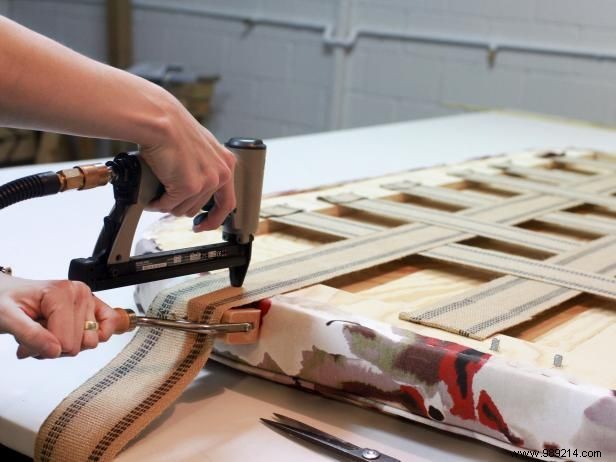The materials you'll need for this project include a footstool with an upholstered front (see How to Make a Two-Dimensional Upholstered Headboard and How to Upholster a Curved, Diamond-Quilted Headboard for instructions).

Start with a full sheet of 3/4” thick plywood. Have the hardware store cut it two inches wider than the width of your bed. The height of the headboard can be adjusted by cutting the legs to size. Be sure to save any leftover plywood for later use. If you're upholstering a headboard organically, run the shape freehand on large paper. Then trace the paper pattern onto the plywood. If the shape is symmetrical, draw half of the shape on the paper, trace it onto the plywood, and then rotate the pattern on the paper to trace the other half.

To make rounded corners, first determine the radius of the curve. Hammer a nail into the plywood the same distance from the edge as the radius. Put a string of the same length on the nail at one end and a pencil at the other. With the string taught, use the pencil to mark the curve.

Use a hacksaw to cut out the headboard shape following the drawn lines. Be sure to wear goggles to protect your eyes from splinters and flying minions.

To hide the hardware, place studs between the two layers of plywood so the threaded ends stick out from the back. Before finishing the back of the footstool, upholster the front. See the section How to Upholster a Curved Headboard with Diamond Tufting for instructions on how to complete various types of upholstery constructions. Staple the straps to the footrest frame and stretch to the opposite side with a strap stretcher. When the tape is at the desired tension, staple and cut the excess 2” beyond the staples. Fold back the excess 2” and staple again. Continue stapling strips of tape vertically and horizontally across the frame. Space the strips 4" to 6" apart and pick them up as you go.

Stretch the burlap tightly over the back surface of the stirrup to create a firm, solid plane. Cut off the excess 2" beyond the staples, fold back and staple again.

The weld bead is optional, but if you plan to attach it, follow the taping instructions from Making a Two-Dimensional Upholstered Headboard. Use your index finger and thumb to line up the welt cord with the wood edge of the footrest and staple through the tail of the twine cord to the footrest frame. Start and stop the ends at the bottom center of the stirrup, leaving an inch of excess at each end. When the tape is fully stapled, open the ends and trim the excess tape so they meet.

Use a piece of tape to secure the two ends of the recording together.

Carefully finish the fabric at the weld bead connection by laying one end of the fabric straight and folding the other under and around the bead. Secure the rope in place by stapling it to the stirrup.

Push the foot of the Pli-Grip into the mesh cord and hook it so that a peg goes through the hole in each foot. The teeth should close towards the outside of the footrest. At the corners cut the Pli-Grip and start the next side with a new piece. When it's attached around it, push the teeth down firmly.

Cover the back surface of the stirrup with Dacron, split the edges in half and staple the bottom layer just behind the Pli-Grip. Cut off the excess Dacron so that the edge is flush with the outer edge of the Pli-Grip.

Cut and staple the Dacron around the studs so it doesn't get caught in the hardware when the footrest is assembled.

Cut a piece of fabric large enough to cover the back of the stirrup plus a few extra inches. Be aware of the location and direction of the pattern when cutting the fabric. Smooth the fabric on one side and mark the outer edge of the Pli-Grip with chalk.

Cut the fabric 1/2" past the chalk line on one side of the stirrup.

Use the flat end of the slider to feed the fabric into the teeth of the Pli-Grip. When you have secured the fabric on one side, smooth the fabric on the opposite side and repeat the steps to cut off the excess and tuck the fabric into the Pli-Grip. Keep working until the fabric is attached around the perimeter of the footrest.

Use a rubber mallet to hit the Pli-Grip all the way.

Just like you did with the Dacron, cut and staple the fabric around the pins. Hammer furniture slides or glues felt pads to the bottom of the legs to protect the fabric from touching the floor.

Put the bolts through the bed frame and secure with washers and nuts.

Your complete footboard will unite your bed in perfect image harmony.